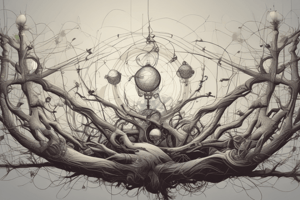Podcast
Questions and Answers
What is the branch of physics that studies the behavior of matter and energy at the atomic and subatomic level?
What is the branch of physics that studies the behavior of matter and energy at the atomic and subatomic level?
Quantum Mechanics
What is the energy of motion?
What is the energy of motion?
Kinetic Energy
What is the law that states that energy cannot be created or destroyed, only converted from one form to another?
What is the law that states that energy cannot be created or destroyed, only converted from one form to another?
Law of Conservation of Energy
What is the standard unit of energy?
What is the standard unit of energy?
What is the branch of physics that studies light, its properties, and behavior?
What is the branch of physics that studies light, its properties, and behavior?
What is the energy stored in chemical bonds?
What is the energy stored in chemical bonds?
What is the energy of position or stored energy?
What is the energy of position or stored energy?
What is the transfer of energy from one object to another?
What is the transfer of energy from one object to another?
Study Notes
Physics
Branches of Physics
- Mechanics: study of motion, forces, and energy
- Thermodynamics: study of heat, temperature, and energy transfer
- Electromagnetism: study of electricity, magnetism, and electromagnetic waves
- Optics: study of light, its properties, and behavior
- Quantum Mechanics: study of the behavior of matter and energy at the atomic and subatomic level
Key Concepts in Physics
- Matter: anything that has mass and occupies space
- Energy: ability to do work or cause change
- Force: push or pull that causes an object to change its motion
- Motion: change in position of an object over time
- Work: transfer of energy from one object to another through a force applied over a distance
Energy
Types of Energy
- Kinetic Energy: energy of motion
- Potential Energy: energy of position or stored energy
- Thermal Energy: energy of heat
- Electrical Energy: energy of moving charges
- Chemical Energy: energy stored in chemical bonds
- Nuclear Energy: energy stored in the nucleus of an atom
Energy Transfer and Conversion
- Energy Transfer: transfer of energy from one object to another
- Energy Conversion: change of energy from one form to another
- Law of Conservation of Energy: energy cannot be created or destroyed, only converted from one form to another
Energy Units
- Joule (J): standard unit of energy
- Calorie (cal): unit of energy, often used to measure energy in food
- Kilowatt-hour (kWh): unit of energy, often used to measure energy consumption in homes and businesses
Physics
Branches of Physics
- Mechanics studies motion, forces, and energy, focusing on how objects move and respond to forces.
- Thermodynamics explores heat, temperature, and energy transfer, examining how energy is exchanged between systems.
- Electromagnetism delves into electricity, magnetism, and electromagnetic waves, investigating the relationships between these fundamental forces.
- Optics examines light, its properties, and behavior, including refraction, reflection, and diffraction.
- Quantum Mechanics investigates the behavior of matter and energy at the atomic and subatomic level, exploring the strange and counterintuitive world of the very small.
Key Concepts in Physics
- Matter is anything that has mass and occupies space, including atoms, molecules, and larger objects.
- Energy is the ability to do work or cause change, and it comes in various forms, including kinetic, potential, thermal, electrical, chemical, and nuclear.
- Force is a push or pull that causes an object to change its motion, and it can be measured in units such as Newtons or pounds.
- Motion is a change in position of an object over time, and it can be described in terms of velocity, acceleration, and displacement.
- Work is the transfer of energy from one object to another through a force applied over a distance.
Energy
Types of Energy
- Kinetic Energy is the energy of motion, possessed by objects that are moving or in motion.
- Potential Energy is the energy of position or stored energy, which can be converted into kinetic energy.
- Thermal Energy is the energy of heat, which is transferred from one object to another through conduction, convection, or radiation.
- Electrical Energy is the energy of moving charges, such as electrons in a wire or ions in a battery.
- Chemical Energy is the energy stored in chemical bonds, which can be released through chemical reactions.
- Nuclear Energy is the energy stored in the nucleus of an atom, which can be released through nuclear reactions.
Energy Transfer and Conversion
- Energy Transfer occurs when energy is transferred from one object to another, such as from a hot stove to a pot of water.
- Energy Conversion is the change of energy from one form to another, such as from electrical energy to light energy in a light bulb.
- Law of Conservation of Energy states that energy cannot be created or destroyed, only converted from one form to another, which means that the total energy of a closed system remains constant.
Energy Units
- Joule (J) is the standard unit of energy, used to measure the amount of energy in a system.
- Calorie (cal) is a unit of energy, often used to measure the energy content of food and drinks.
- Kilowatt-hour (kWh) is a unit of energy, often used to measure the energy consumption of homes and businesses over a period of time.
Studying That Suits You
Use AI to generate personalized quizzes and flashcards to suit your learning preferences.
Description
Explore the main branches of physics, including mechanics, thermodynamics, electromagnetism, optics, and quantum mechanics, as well as key concepts such as matter and energy. Test your understanding of the fundamental principles of physics.




